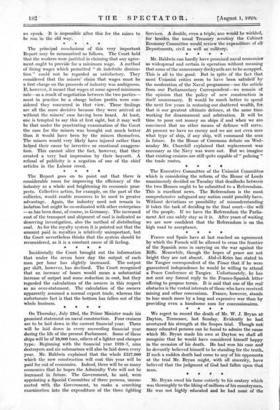The principal conclusions of this very important Report may be
sununarized - as follows. The Court held that the workers were justified in claiming that any agree- ment ought to provide for a minimum wage. A method of fixing wages which permitted " at indefinite diminu- tion" ' could not be regarded as satisfactory. They considered that the miners' claim that wages must be a first charge on the proceeds of industry was ambiguous. If, however, it meant that wages at some agreed minimum rate--as a result of negotiation between the two parties— must in practice be a charge before profits were con- sidered they concurred in that view. These findings are all the more decisive because they were arrived at without the miners' case having been heard. At least, one is tempted to say this at first sight, but it may well be that under the penetrating examination of the Court the case for the miners was brought out much better than it would have been by the miners themselves. The miners would very likely have injured rather than helped their cause by invective or emotional exaggera- tion. This cannot alter the fact, however, that they created a very bad impression by their boycott. A refusal of publicity is a negation of one of the chief articles in the Labour creed.
* *






































 Previous page
Previous page